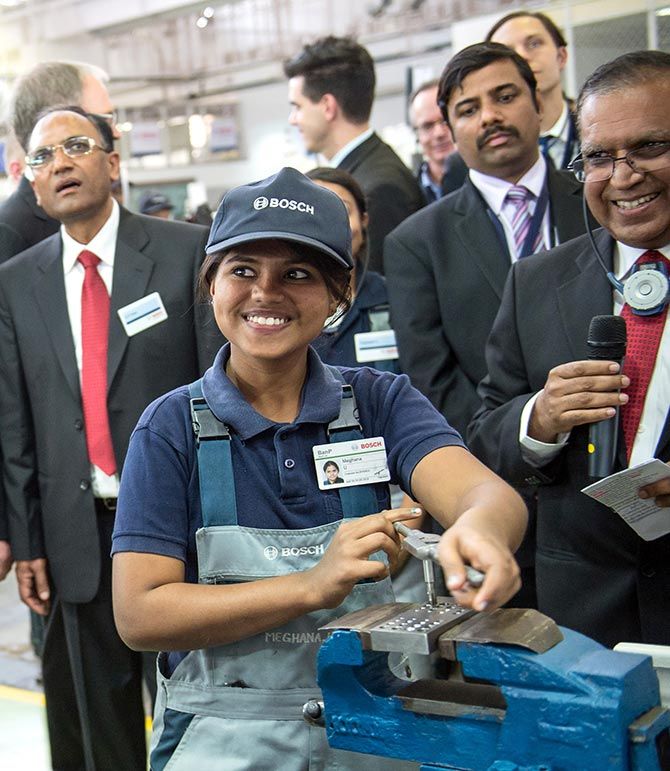'Is standing in a queue any bigger sacrifice than that of a soldier's family?' asks Virender Kapoor, author and management guru.

'Ask not what your country can do for you,' said John F Kennedy, 'ask what YOU can do for your country.'
Over 60% of India's population is less than 30 years of age. But how many youth are actively involved in policy and decision making?
How many global entrepreneurs have we created?
A country's growth story vests entirely on the active participation of its youth.
Emphasising on Kennedy's thoughts, here are my suggestions on how the youth of India can positively contribute in nation building.
1. Look at the bigger picture
Our image of the Indian government and its future changed drastically last fortnight.
Prime Minister Modi took a major political risk by announcing the demonetisation of Rs 500 and Rs 1,000. Within hours, some critics condemned the decision, saying it was causing inconvenience to people.
When a soldier dies in a war, his entire family suffers. The family doesn't blame the rest of the country for claiming his life.
With much difficulty and emotions, they accept death with grace for the larger good of the country.
Is standing in a queue any bigger sacrifice than that of a soldier's family?
The youth need to stop complaining about the little sacrifices we make for the future good of the nation.
2. What you sow today, you reap tomorrow
Consider a ship moving in a large ocean. For the captain to turn it by even 5 degrees in crises, he has to consider so many options, seek so many permissions.
How then can we expect the prime minister of the country to function like a magic wand?
Some of the policies he has announced in the last two years may not have reaped instant results. But in 15 years or more, there will be a positive shift.
Some policies are like the seeds sown in the soil by a young farmer. He may not be able to enjoy the fruits, but at least his son, daughter or the future generation may be able to reap the benefits.
Similarly, if the youth of the country stop thinking about immediate gains all the time and instead invest in the tomorrow and have patience, it will lead to a brighter future.
3. The 3 Ps of success -- Productivity, Participation and Profitability
No country can prosper without the help of its young leaders.
The productivity, participation and profitability of the youth accounts to the overall growth and success of the country.
The Pradhan Mantri Mudra Yojna is a classic example in point.
Approximately Rs 2 lakh crore has been disbursed for the project which aims to encourage first-time small entrepreneurs.
The idea behind the policy is simple -- if you give fish to a hungry man, he will eat for a day; if you teach him how to fish, he will eat for life.
India needs wilful youngsters to come forward and avail of such schemes.
We need many micro entrepreneurs and leaders in villages who can set up their businesses and thus create more jobs for the country.
4. Make In India
Those of you who believe that America is a superpower because of its IT force do not know the country much.
America is a manufacturing superpower. There is nothing the country doesn't manufacture -- steel, cement, fabrics, diary products, guns, tanks, aircrafts -- name it; they have it.
In the last few decades, we have neglected China as a small country; but do you know its manufacturing power?
If you look at India, our youngsters are still busy and happy going for the low hanging fruits in business -- they launch an app, an e-commerce store, write programmes and are happy with the money they make.
Yes, manufacturing involves a lot of risk, and requires effort, so what? Why are we not looking at the blue collared jobs and the opportunities around it?
With so much of talent, why is it that we cannot make our own Google, Facebook or Twitter?
It is time the youth of India aimed higher and took greater risks.
Greater risk=Greater reward.
5. Motivation and perception
Great disasters create leaders. In the case of India, we always come with abundance of doubt and scepticism.
Even before a policy is announced, we try to find faults in it.
For heaven's sake, everyone cannot be a chor.
Your own folks may be working as teachers, banking professionals, in government institutions and defence forces. Think about them. Are they all thieves?
There may be some good people. You have to learn to trust more people.
For example, if a certain leader or boss in your organisation has done 8 out of 10 things right, give her/him credit for it.
Instead of mocking at the wrongs, change your perception and look at the brighter side of things.
In any situation or crises, the youth must come forward and spread positivity.
If you badmouth your own country and its people, the world will stop taking you seriously.
Even in times of crises, we have to stick around like a family, acknowledge our setbacks and get moving forward as a team.
6. Stand Up India
A larger number of students visit rural areas as part of their internships in college and during their early career days to educate and empower the youth.
This should continue without any incentive.
There are so many government schemes, policies and opportunities available to the less privileged that they are not aware of. If each young member makes a team and adopts a village, there is so much hope for us.
This team can visit the village, make a presentation on the different rights they can avail of and educate them on how to access them.
We need the youth to participate in promoting people at the grassroots levels.
7. Stop following the herd
In India, since the time we are born, there is a common mentality to follow the herd. Bhed chaal, we call it.
We want our kids to be engineers, doctors, but we don't want them to take risks, explore new avenues.
One-third of India's economy is agrarian, why hasn't anyone thought of aggregating the farmers.
Suppose you have a small acre of land, your neighbours have one acre each; why not aggregate them and distribute costs and profits?
If we want to move ahead, there has to be transparency and indigenous leadership at all levels.
China's success is a brilliant example of thriving blue collar economy. The youth needs to stop copying, start risking.
8. Self imposition
If any of you have travelled to Europe or a foreign nation for a few days, you'll understand this point.
We appreciate that abroad, the roads are clean and the system is well managed. Have you ever wondered why?
The same people who shamelessly spit and litter in India will behave themselves when they are in a foreign land.
Why? Because you'll be punished if you flout the rules.
In India, there is no self discipline.
The Swachh Bharat Abhiyan requires two hands to function.
You cannot expect the prime minister to come and clean your housing society.
It is your individual and collective responsibility and you have to ensure that your home and surroundings is clean.
This sense of proactiveness in the youth of today will go a long way in improving attitudes in people in the future.
As told to Divya Nair/Rediff.com
Lead image published only used for representational purposes. Photograph: Reuters
 Virender Kapoor is the former director of Pune's Symbiosis Institute of Management and the founder of Management Institute for Leadership and Excellence.
Virender Kapoor is the former director of Pune's Symbiosis Institute of Management and the founder of Management Institute for Leadership and Excellence.
He is the author of Winning Instinct: Decoding the Power Within, Leadership: The Gandhi Way, A Wonderful Boss: Great People to Work With, Passion Quotient, Innovation, the Einstein Way and Speaking the Modi Way.










